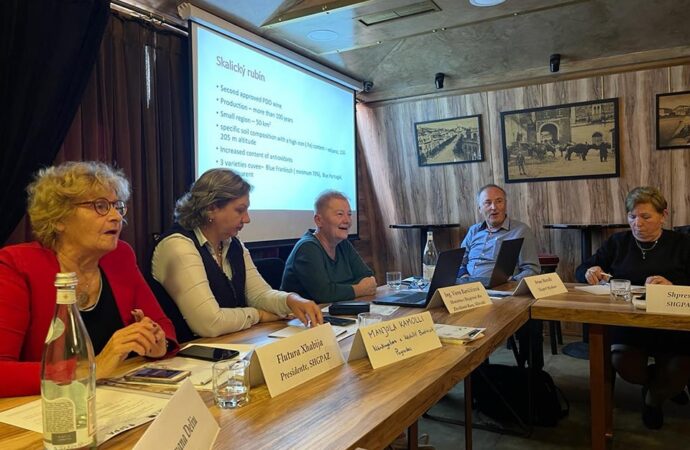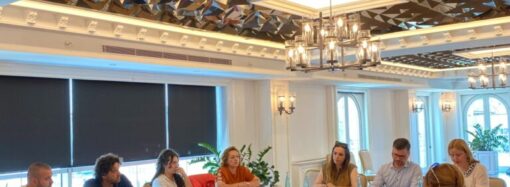On Friday, October 28, 2022, the second session for Working Group V (Trade and Economic Issues) on the topic “Standards on production of traditional and artisanal food – Slovak experience (Chapter 1)” was held in Pogradec. This meeting is organized in the framework of the National Convention on European Integration, which is implemented by the EMA in cooperation with the Slovak Foreign Policy Association (SFPA) and with the support of SlovakAid. EMA in collaboration with the Albanian National, Professional, Businesswomen and Crafts’ Association (SHGPAZ) and the Municipality of Pogradec brought together entrepreneurs, experts and members of CSOs to discuss the main challenges faced by enterprises in Albania, the support that can be provided by governmental institutions and how it can be benefited from the European and Slovak experience.
The meeting started with a welcoming speech by Nirvana Deliu, EMA, who gave an overview of the integration process for Albania and the importance of the European Convention initiative. EMA’s effort to organize discussion tables in cities other than Tirana, goes hand in hand with the integration process’s objective of inclusion and involvement of civil society and other stakeholders through active talks and consultations.
The word then passed on to Flutura Xhabija, President of SHGPAZ, who spoke about the significance of such a gathering to address problems and practical issues encountered by entrepreneurs in small towns like Pogradec. She emphasized how important it is to learn from the Slovak experience in order to speed up the integration process and achieve the envisioned development.
The first part of the activity started with a presentation by Manjola Kamolli, Deputy Head of the Municipal Council in Pogradec Municipality, who delineated the economic situation of the city, the objectives targeted by the local government and the achievements so far. The diversity of food and craft products in the city and local entrepreneurs was mentioned, focusing on traditional products. Kamolli also gave an overview of the support and facilities that the Municipality of Pogradec has included in the strategic plan to help local businesses. This includes some fiscal facilities for new businesses, support for women entrepreneurs as a special target group, increased incentives for the establishment of start-ups, publication of business informative materials, achievement of standards for local products, regular public consultations, etc. The presentation highlighted the municipality’s plan to provide assistance to local producers in obtaining certifications for national brands or patents, to create export opportunities for local products, opportunities for the city’s youth, to bring innovations, increase efficiency and profitability for entrepreneurs.
In the second part Ing. Viera Baričičová, PhD, expert at the Ministry of Agriculture in Slovakia, presented the European framework of food standards and quality schemes. Baričičová summarized in brief how the necessity arose in the EU to regulate and protect geographical indications, as well as outlining the current EU legislation. She spoke about quality schemes in the EU and the specific and strict criteria that must be met to obtain these stamps, and the establishment of such a system at national level as well. It was noted that geographical indications have a double function as they are recognized as intellectual property [of producers] and have an increasingly important role in trade negotiations between the EU and other countries. Baričičová shared with the participants success stories from Slovakia in obtaining these certificates, as well as other cases from her experience as an expert at the Ministry in Slovakia and her ongoing work in Kosovo.
The session concluded with an open discussion among the participants on the challenges that business operators face in meeting quality standards, promotion of their products, and the lack of financial and technical support. The attendees addressed practical issues they encounter as entrepreneurs to try and find common solutions. The Slovak expert answered specific questions about subsidy schemes in the EU and Member States, strategies and fund allocation. Baričičová also stopped to mention funds from which non-EU countries can benefit from. Moreover, it was determined that a cooperation between different public and private actors needs to be achieved to empower entrepreneurs and increase product value, where the emphasis was placed on a stronger partnership between the relevant Ministries, business and local government.


















